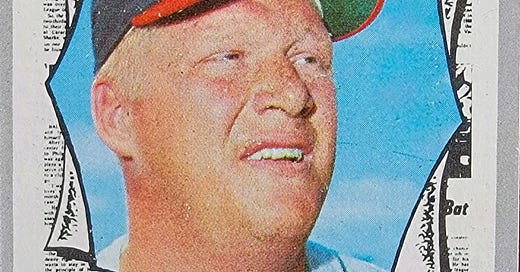The Bird Tapes Interview: Boog Powell (Part 2)
In the second part of his vintage interview, the slugger reflects on Baltimore's fans, the money he could have made and the World Series losses that kept his Orioles from a grander place in history.
Listening to my 1999 interview with Boog Powell a quarter-century later, I was stopped cold by a comment he made near the end.
“I needed another year,” he said about his decision to keep playing after the Orioles had traded him to the Cleveland Indians and his career began to wind down.
He meant he needed another year of his baseball salary — more money.
It struck me: My interview with him vividly depicted what it was like to be a major league player in the 1960 and 1970s, before they earned the right to free agency and began to make bigger money.
Boog, the most honest of souls, talks a lot about his finances in the second half of our vintage interview, available below to paid Bird Tapes subscribers. He did alright for his era. How could he not? He was a star player, a middle-of-the-order slugger on a championship team. One year, he was voted the American League’s Most Valuable Player. After starting low in the early 1960s, his annual salary rose and rose, approaching six figures.
Still, he never came close to making the kind of money that succeeding generations of players did. It was his misfortune to miss the big money by the narrowest of margins, retiring in the mid-1970s just as the players earned free agency and their financial fortunes began to change.
In our interview, Boog talks about needing to work for a liquor company in the off-season in the 1960s and buying a house in Loch Raven, a hardworking neighborhood. Various Orioles executives told him that he was too young to make the kind of money he wanted and refused even to meet with an agent if one tried to negotiate for him.
It all sounds old-fashioned and almost quaint in 2024 unless you were the one trying for years to wield even a semblance of leverage.
The owners were on the precipice of losing the upper hand to the players’ powerful union, but that fateful reversal had not occurred when Boog’s career ended.
After baseball, he opened a marina business in his native Florida and ran it through the 1980s. Business was good, but never easy. Now you know why he wanted to open a signature BBQ stand, with his name on it, when the Orioles moved from Memorial Stadium to Camden Yards in 1992.
Offering plates of sumptuous BBQ, with Boog on hand, the stand became an enduring success, as intrinsic to Camden Yards as the warehouse rising behind it.
It’s still going strong in 2024.
When I interviewed Boog in 1999, he was flying high. “It’s almost like I’m playing again,” he said, referring to his nightly interactions with fans who wanted to eat his food and shake his hand by the cash register. You can tell that he enjoyed bringing happiness to the people who recalled his glory days on the diamond. And he certainly didn’t mind that his line of paying customers stretched so far on some nights that he couldn’t see the end of it from where he sat.
Keep reading with a 7-day free trial
Subscribe to The Bird Tapes to keep reading this post and get 7 days of free access to the full post archives.






